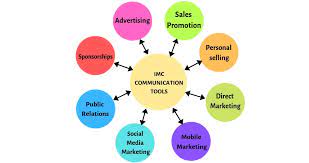The Power of Integrated Marketing Communication
Integrated Marketing Communication (IMC) is a strategic approach that ensures all communication channels are carefully linked together to deliver a consistent message to target audiences. In today’s competitive business landscape, IMC has become a vital tool for companies looking to create a strong and unified brand presence.
Key Components of IMC
IMC combines various elements of marketing communication, including advertising, public relations, direct marketing, social media, and sales promotion. By integrating these channels, companies can create a seamless and cohesive brand experience for their customers.
The Benefits of IMC
One of the main advantages of IMC is that it helps build brand consistency and recognition. When all communication channels convey the same message and values, customers are more likely to develop trust and loyalty towards the brand. Moreover, IMC allows companies to maximise the impact of their marketing efforts by ensuring that each channel reinforces the others.
Implementing an IMC Strategy
Developing an effective IMC strategy requires careful planning and coordination across all departments within an organisation. Companies need to define their target audience, establish clear communication objectives, and select the most appropriate channels to reach their customers. Regular monitoring and evaluation are also essential to ensure that the IMC strategy remains relevant and effective.
Case Study: Successful Implementation of IMC
Company X recently launched a new product using an integrated marketing communication approach. They combined traditional advertising with social media campaigns, influencer partnerships, and PR activities to create buzz around the product launch. As a result, Company X saw a significant increase in brand awareness and product sales.
Conclusion
Integrated Marketing Communication is not just a trend but a necessary strategy for companies looking to stand out in today’s crowded marketplace. By aligning all communication channels towards a common goal, businesses can create a strong brand identity that resonates with customers and drives long-term success.
Mastering Integrated Marketing Communication: 6 Essential Tips for Success
- Ensure consistency in messaging across all communication channels.
- Use a mix of traditional and digital marketing strategies for a comprehensive approach.
- Understand your target audience to tailor your messages effectively.
- Integrate PR, advertising, social media, and other channels for maximum impact.
- Measure the effectiveness of your campaigns to make data-driven decisions for future strategies.
- Continuously adapt and refine your integrated marketing communication plan based on performance metrics.
Ensure consistency in messaging across all communication channels.
Ensuring consistency in messaging across all communication channels is a fundamental tip in integrated marketing communication. By maintaining a unified message that resonates with the brand’s values and objectives, companies can enhance brand recognition and build trust with their target audience. Consistent messaging helps reinforce key brand attributes and creates a cohesive brand experience for customers, regardless of the channel they engage with. This approach not only strengthens brand identity but also increases the effectiveness of marketing campaigns by presenting a clear and coherent message that leaves a lasting impression on consumers.
Use a mix of traditional and digital marketing strategies for a comprehensive approach.
To maximise the effectiveness of integrated marketing communication, it is essential to blend traditional and digital marketing strategies. By combining the reach and tangibility of traditional methods with the precision and interactivity of digital channels, companies can create a comprehensive approach that resonates with diverse audiences. This mix allows for a more holistic brand experience, ensuring that messages are delivered consistently across various platforms while leveraging the strengths of both traditional and digital marketing to achieve optimal results.
Understand your target audience to tailor your messages effectively.
To effectively leverage integrated marketing communication, it is crucial to have a deep understanding of your target audience. By gaining insights into their preferences, behaviours, and needs, you can tailor your messages in a way that resonates with them. This personalised approach not only enhances the relevance of your communication but also increases the likelihood of engaging and connecting with your audience on a more meaningful level. Ultimately, understanding your target audience allows you to craft messages that are not only impactful but also drive desired actions and outcomes.
Integrate PR, advertising, social media, and other channels for maximum impact.
To maximise the effectiveness of integrated marketing communication, it is crucial to seamlessly integrate public relations, advertising, social media, and other relevant channels. By aligning these various communication platforms towards a unified message and strategic goal, businesses can create a powerful and consistent brand presence that resonates with their target audience. This holistic approach ensures that each channel complements the others, amplifying the impact of the overall marketing campaign and ultimately driving engagement, brand loyalty, and business growth.
Measure the effectiveness of your campaigns to make data-driven decisions for future strategies.
To maximise the impact of integrated marketing communication, it is crucial to measure the effectiveness of your campaigns and analyse the data obtained. By tracking key performance indicators and metrics, businesses can gain valuable insights into what works and what doesn’t in their marketing efforts. This data-driven approach enables companies to make informed decisions for future strategies, optimise their campaigns, and allocate resources more effectively. Ultimately, measuring campaign effectiveness empowers businesses to refine their integrated marketing communication tactics and achieve greater success in reaching and engaging their target audience.
Continuously adapt and refine your integrated marketing communication plan based on performance metrics.
To maximise the effectiveness of your integrated marketing communication strategy, it is crucial to continuously adapt and refine your plan based on performance metrics. By closely monitoring key performance indicators such as conversion rates, website traffic, social media engagement, and customer feedback, you can identify what is working well and what areas need improvement. This data-driven approach allows you to make informed decisions, optimise your communication channels, and ensure that your messaging resonates with your target audience effectively. Adapting and refining your IMC plan based on performance metrics not only enhances the overall impact of your marketing efforts but also helps you stay agile and responsive in a dynamic business environment.

